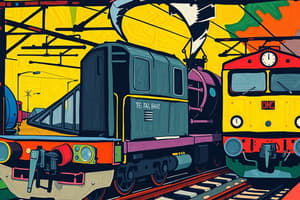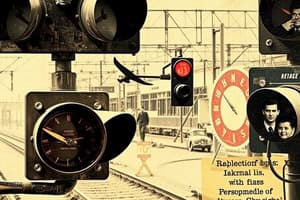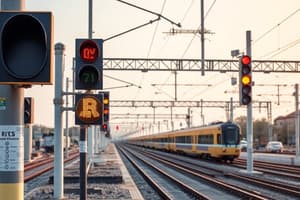Podcast
Questions and Answers
What is displayed when a Calling On signal is taken in the 'ON' position?
What is displayed when a Calling On signal is taken in the 'ON' position?
- miniature yellow light (correct)
- miniature white light
- no light
- single yellow light
What light is displayed when the colour light Calling On signal is taken 'OFF'?
What light is displayed when the colour light Calling On signal is taken 'OFF'?
- green
- miniature yellow
- miniature red (correct)
- white
What is the aspect of the Calling On signal when taken 'OFF'?
What is the aspect of the Calling On signal when taken 'OFF'?
- proceed
- proceed slow (correct)
- caution
- stop
What is the condition for taking 'OFF' the Calling On signal?
What is the condition for taking 'OFF' the Calling On signal?
What is the indication of the Calling On signal when taken 'OFF'?
What is the indication of the Calling On signal when taken 'OFF'?
What type of shunt signal is used?
What type of shunt signal is used?
When is the Calling On signal taken 'OFF'?
When is the Calling On signal taken 'OFF'?
What does the Calling On signal indicate to the driver?
What does the Calling On signal indicate to the driver?
What signal should be used to warn an incoming train of an obstruction during the day?
What signal should be used to warn an incoming train of an obstruction during the day?
What time is the standard time prescribed by the Government of India transmitted daily to all the principal stations of the Railway?
What time is the standard time prescribed by the Government of India transmitted daily to all the principal stations of the Railway?
What should a Station Master do as soon as they become aware that a signal has become defective or has ceased to work properly?
What should a Station Master do as soon as they become aware that a signal has become defective or has ceased to work properly?
When is pre-warning about a defective reception signal not required?
When is pre-warning about a defective reception signal not required?
Before dispatching a passenger train or mixed train from a station, what time should be considered?
Before dispatching a passenger train or mixed train from a station, what time should be considered?
How may the Loco Pilot pass a defective home signal when pre-warning is given?
How may the Loco Pilot pass a defective home signal when pre-warning is given?
Who sets his watch by the station clock or the clock at the authorised place of reporting for duty before a train starts from a terminal or crew-changing station?
Who sets his watch by the station clock or the clock at the authorised place of reporting for duty before a train starts from a terminal or crew-changing station?
Who sanctions the speed limits for each section of the railway?
Who sanctions the speed limits for each section of the railway?
What condition must the Station Master fulfill before pre-warning the Loco Pilot about a defective signal at the next station?
What condition must the Station Master fulfill before pre-warning the Loco Pilot about a defective signal at the next station?
Where are the sectional speed sanctioned and permanent speed restrictions shown?
Where are the sectional speed sanctioned and permanent speed restrictions shown?
What is the purpose of the red flag signal?
What is the purpose of the red flag signal?
What is the limiting factor for running a train on each section of the railway?
What is the limiting factor for running a train on each section of the railway?
What should the Station Master report to the railway servant responsible for the upkeep of the signals?
What should the Station Master report to the railway servant responsible for the upkeep of the signals?
When can the Loco Pilot pass a defective signal?
When can the Loco Pilot pass a defective signal?
What color should side lights show towards the engine in a normal position?
What color should side lights show towards the engine in a normal position?
What color should side lights show towards the rear in a normal position?
What color should side lights show towards the rear in a normal position?
Which type of trains may be dispensed with side lights?
Which type of trains may be dispensed with side lights?
How is the last vehicle of a train distinguished by day?
How is the last vehicle of a train distinguished by day?
How is the last vehicle of a train distinguished by night or in low visibility?
How is the last vehicle of a train distinguished by night or in low visibility?
What can be used in lieu of a tail board or an unlit tail lamp in emergencies?
What can be used in lieu of a tail board or an unlit tail lamp in emergencies?
Why are side lights important in railway safety?
Why are side lights important in railway safety?
What is the primary purpose of distinguishing the last vehicle of a train?
What is the primary purpose of distinguishing the last vehicle of a train?
What is the maximum speed at which trains shall not exceed over turn-outs and cross-overs?
What is the maximum speed at which trains shall not exceed over turn-outs and cross-overs?
What is the maximum speed at which a train shall run through an interlocked station?
What is the maximum speed at which a train shall run through an interlocked station?
At what speed shall an engine or self-propelled vehicle not push any train outside station limits?
At what speed shall an engine or self-propelled vehicle not push any train outside station limits?
When are engine pushing rules not applicable to a train?
When are engine pushing rules not applicable to a train?
What is the maximum speed for a train to run through an interlocked station if special instructions permit a higher speed?
What is the maximum speed for a train to run through an interlocked station if special instructions permit a higher speed?
What is the condition for an engine or self-propelled vehicle to push a train outside station limits?
What is the condition for an engine or self-propelled vehicle to push a train outside station limits?
When can engine pushing rules be operated under approved special instructions?
When can engine pushing rules be operated under approved special instructions?
What is the maximum speed for a train to run over turn-outs and cross-overs if the permissible speed is higher?
What is the maximum speed for a train to run over turn-outs and cross-overs if the permissible speed is higher?
Flashcards
Calling On Signal Procedure
Calling On Signal Procedure
When a train encounters a Calling On signal, it must stop at the signal, then proceed slowly, cautiously, and be ready to stop quickly to avoid obstacles.
Calling On Signal "OFF" Aspect
Calling On Signal "OFF" Aspect
The indication of a Calling On signal when it's not active is 'proceed slow'.
Calling On Signal Indication (OFF)
Calling On Signal Indication (OFF)
Indicates to stop, then proceed carefully and be ready to stop immediately if needed.
Shunt Signal Types
Shunt Signal Types
Signup and view all the flashcards
Defective Signal Reporting
Defective Signal Reporting
Signup and view all the flashcards
Pre-warning Defective Signal
Pre-warning Defective Signal
Signup and view all the flashcards
Defective Signal Exemption
Defective Signal Exemption
Signup and view all the flashcards
Train Working Regulation
Train Working Regulation
Signup and view all the flashcards
Train Dispatch Time
Train Dispatch Time
Signup and view all the flashcards
Guard's Time Setting
Guard's Time Setting
Signup and view all the flashcards
Train Section Speed Limits
Train Section Speed Limits
Signup and view all the flashcards
Working Time Table
Working Time Table
Signup and view all the flashcards
Turnouts and Crossovers Speed
Turnouts and Crossovers Speed
Signup and view all the flashcards
Interlocked Station Speed
Interlocked Station Speed
Signup and view all the flashcards
Engine Pushing Speed
Engine Pushing Speed
Signup and view all the flashcards
Engine Pushing Exception
Engine Pushing Exception
Signup and view all the flashcards
Train Sidelights
Train Sidelights
Signup and view all the flashcards
Train Tail Designation
Train Tail Designation
Signup and view all the flashcards
Study Notes
Calling On Signals
- When taking off Calling On signal, the train must be brought to a stand at the stop signal.
- The Aspect of the Calling On signal when taken "OFF" is "proceed slow".
- The indication of the Calling On signal when taken "OFF" is "stop and then draw ahead with caution and be prepared to stop short of any obstruction".
- Types of shunt signals include disc type, miniature semaphore, and position type.
Defective Signals
- When a Station Master becomes aware of a defective signal, they shall report the occurrence to the railway servant responsible for the upkeep of the signals and take necessary action.
- Pre-warning about defective reception signal is not required when there is a calling on signal.
- When a home signal is defective and pre-warned, the LP may pass such signal on receipt of PHS at the foot of the defective signal or PHS at the first facing points or T.369(3b)+PHS.
Regulation of Train Working
- The working of trains between stations shall be regulated by the standard time prescribed by the Government of India, transmitted daily to all principal stations at 16:00 hours.
- No passenger train or mixed train shall be dispatched from a station before the standard time.
- Before a train starts from a terminal or crew-changing station, the Guard shall set his watch by the station clock or the clock at the authorized place of reporting for duty and communicate the time to the Loco Pilot.
Speed Restrictions
- Every train shall be run on each section of the railway within the limits of speed sanctioned for that section by approved special instructions.
- Sectional speed sanctioned and permanent speed restrictions shall be shown in the Working Time Table.
- The speed of trains over turn-outs and cross-overs shall not exceed 30 kmph, or the permissible speed, whichever is less, unless otherwise prescribed by approved special instructions.
- No train shall run through an interlocked station at a speed exceeding 50 kmph, or such less speed as may be prescribed by approved special instructions.
- No engine or self-propelled vehicle shall push any train outside station limits except in accordance with special instructions and at a speed not exceeding 25 kmph.
Engine Pushing Rules
- Engine pushing rules shall not apply to a train the leading vehicle of which is equipped with driving apparatus and may be operated under approved special instructions.
Lighting
- Side lights shall show towards the engine in normal position, displaying white, and towards the rear in normal position, displaying red.
- Side lights may be dispensed with for EMU trains and goods trains.
- The last vehicle of a train shall be distinguished by affixing a tail board or a tail lamp of approved design to indicate that the train is complete.
Studying That Suits You
Use AI to generate personalized quizzes and flashcards to suit your learning preferences.




